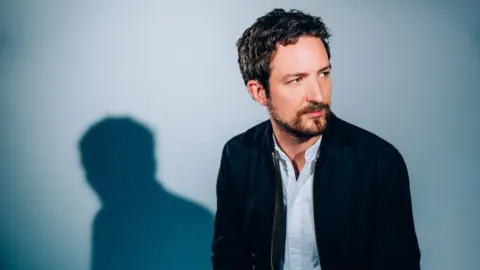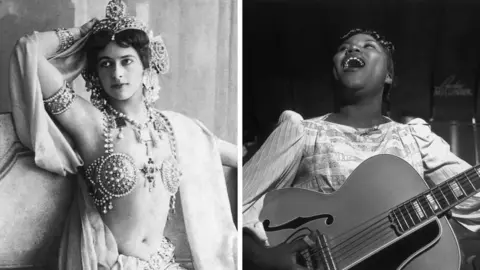Frank Turner excavates history's forgotten women
 Ben Morse
Ben MorseFrank Turner's eighth album is dedicated to female spies, nuns and musicians that time has forgotten. It's seen him accused of mansplaining history, "but I don't see anyone else telling these stories", he tells the BBC.

When he first started making music with hardcore punk band Million Dead, Frank Turner refused to join the nightly ritual of tour bus debauchery.
"I have a vivid memory of being in Belgium," he recalls. "People were drinking anything that wasn't nailed to the floor and I was sat on my bunk, reading my notes."
It's not that the singer had a puritanical streak - far from it - but the tour clashed with a deadline for Turner's history degree, so every night, he'd hunker down to research the British-Bulgarian tobacco trade in the 1930s.
The paper eventually earned him a first-class honour - but his subsequent decision to quit and pursue music left his tutor unimpressed.
"She said, 'You've done really well, ditch this stupid music stuff and come and do your Masters with me.
"And I said, 'Music is my dream. No offence, but academia can wait'.
"Almost 10 years later, I was playing the O2 and I sent her an email saying, 'I don't know if you remember me, but we're headlining the biggest indoor venue in London and I've got a box set aside for you'.
"And she replied, 'I'm still not interested in this frivolous music of yours.'"
But maybe Turner's new solo album, his eighth, will finally win over Professor Prazmowska.
Called No Man's Land, it unleashes his "inner history nerd", collecting the stories of 13 women who don't always get their dues, from rock 'n' roll pioneer Sister Rosetta Tharpe to dancer-turned-spy Mata Hari.
 Getty Images
Getty ImagesInitially planned as an EP, it blossomed into an album when friends got wind of the project, "and I got swamped by an enormous list of women who have not been recognised by popular culture".
The problem then became one of research, sifting through sources ("on Google! I'm not going to claim I was in cotton gloves in the archives of the British Library") until Turner found 13 suitable stories.
Mansplaining?
"The interesting thing is, you can't just put a name on a piece of paper and go, 'Write a song about her'. There has to be a hook," he explains.
"So, for example, I am fascinated by the story of Amelia Earhart - she was gay, she was the first woman who flew trans-Atlantic, she crash-landed in the desert, no-one knows where she's buried - but I couldn't quite find the way in, so I very reluctantly put that one on the backburner.
"Whereas, with someone like [Egyptian activist] Huda Sha'arawi, there's a moment where she arrives at Cairo train station in 1923 and removes her face veil and says, 'Enough!'
"Well, there you go: There's your central image, there's your chorus."
In keeping with the album's feminist spirit, Turner hired an all-female backing band, and asked Catherine Marks, one of the UK's few prominent female producers, to helm the recording sessions.
Despite that, he's been accused of "mansplaining" history, perpetuating a pattern of male writers telling stories that belong to women.
"By positioning himself at the centre of proceedings, he's inadvertently fishing for a pat on the back," wrote El Hunt in one such column for the NME.
Turner acknowledges "there are sensible, intelligent questions being raised about my presentation of this record".
"But I don't feel I'm crowding out other voices, I don't know of anyone else who's writing songs about Huda Sha'arawi right now.
"I mean, I can write a record about lesser-known historical men if you want, but it doesn't seem particularly worth my time."
More broadly, he says, it's important for men to acknowledge how women have been subjugated and mistreated.
'Shocking and surprising'
Take, for example, Jinny Bingham, a 17th Century landlady whose ghost is still said to haunt Camden pubs.
"In her early life [she] was a vibrant member of the community," says Turner, "and simply by becoming old and being single, she became a hate figure who was accused of witchcraft.
"There's an injustice there that cries out, and of course I find it shocking and surprising - but it's an experience I have to think myself into because I have the privilege of my gender."
 Getty Images
Getty ImagesTo explore these stories more thoroughly, Turner created a podcast where he interviews (predominantly female) historians about his album's characters.
In one episode, he travels to Dodge City to learn more about Dora Hand, a vaudeville performer who was accidentally shot to death by a small-time outlaw.
To his amusement, Lynn Johnson, who runs the local museum, ended up fact-checking his lyrics.
"I was like, 'Dora Hand's funeral was a huge event,' and Lynn went, 'Actually we don't know anything about her funeral, or even where she's buried.'
"Of course at that point I plead artistic license," he laughs, but the haziness surrounding Dora's death raised a serious point the neglect of women's stories.
"There is just one book in total about Sister Rosetta Tharpe," says Turner, "but a lot of these women stand out, and there's something bold about that.
"For their names to ring out despite the ravages of time and bias, it makes me in awe of them."
Allow Google YouTube content?
He's particularly taken with the story of Kassiani - an enigmatic poet who lived in 9th Century Constantinople.
She was chosen to be the Emperor's wife but rejected his proposal with a withering put-down and ran off to form a convent.
As an abbess, she continued to defy Emperor Theophilos, an iconoclast who was smashing up works of art and religious images.
"Legend has it that Kassiani was quietly redrawing them in her cell and stashing them under the bed for when his reign was over," says Turner.
"She's also the earliest female composer whose music has survived to the present day, and one of only two women whose signatures we have from the pre-modern era.
"There's something remarkable about her."
In tribute, Turner repurposes one of Kassiani's melodies as he recounts her story, on one of No Man's Land's stand-out tracks.
Allow Google YouTube content?
But the record closes with a more personal story: That of his mother, Rosemary Jane, who held his family together in spite of a husband "who was dead to himself and everyone else".
Turner says he was estranged from his father, a city investment banker, for a decade. Their relationship only thawed recently after the death of his uncle, "who was sort of a surrogate father for me".
"In his sickness there were some moments of conciliation," says the singer, "but the story is long and complicated, and something that I'm not yet prepared to discuss publicly."
Which raises a problem for the final episode of his podcast...
"I don't want to discuss our collective family trauma on the series, so the idea we've come up with is that my mum is going to review the album - and I'm now terrified," he says, only half-joking.
"I think she's gone deep - she keeps texting me questions. And having been a primary school teacher for 40 years, there's a certain tone of voice she can switch on which still makes my blood run cold, so I'm a little nervous of that podcast."
And what about his disapproving history tutor? Could she be persuaded to review No Man's Land?
"Oh God, we should get her on the podcast, too!" Turner gasps.
"I'll definitely send her a copy of the album... But she still won't come to a gig."
No Man's Land is released on 16 August by Xtra Mile / Polydor.

Follow us on Facebook, or on Twitter @BBCNewsEnts. If you have a story suggestion email [email protected].
